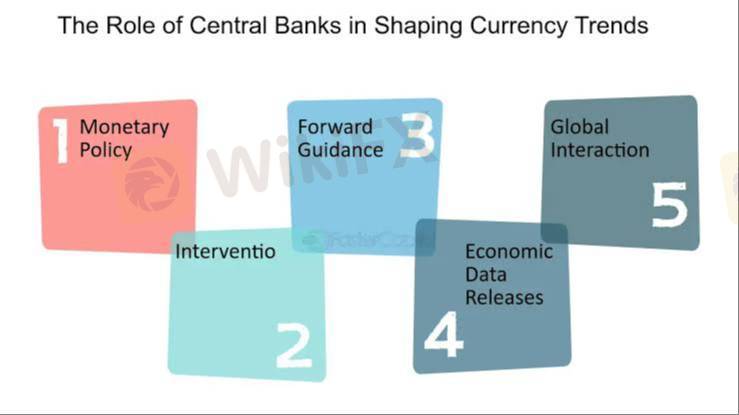
2025-02-14 16:44
IndustryThe role of central banks in shaping Forex Economi
#firstdealofthenewyearastylz
Central banks play a crucial role in shaping Forex economic trends through various monetary policy tools and actions. Here's a detailed explanation:
1. Interest Rates
Central banks set interest rates to control inflation, stimulate economic growth, and influence currency values.
*Impact on Forex:*
- Higher interest rates: Attract foreign investors, strengthen currency
- Lower interest rates: Weaken currency, encourage borrowing
2. Quantitative Easing (QE)
Central banks create new money to purchase assets, injecting liquidity into the economy.
*Impact on Forex:*
- Increases money supply: Weakens currency, stimulates economic growth
- Reduces interest rates: Weakens currency, encourages borrowing
3. Forward Guidance
Central banks communicate future policy intentions to influence market expectations and shape interest rates.
*Impact on Forex:*
- Hawkish guidance: Stronger currency, higher interest rates expected
- Dovish guidance: Weaker currency, lower interest rates expected
4. Reserve Requirements
Central banks set reserve requirements for commercial banks, influencing the amount of credit available in the economy.
*Impact on Forex:*
- Higher reserve requirements: Reduces lending, strengthens currency
- Lower reserve requirements: Increases lending, weakens currency
5. Currency Intervention
Central banks buy or sell currencies to influence exchange rates, manage inflation, or stabilize financial markets.
*Impact on Forex:*
- Buying currency: Strengthens currency, reduces supply
- Selling currency: Weakens currency, increases supply
6. Macroprudential Policies
Central banks implement policies to mitigate systemic risk, such as countercyclical capital buffers or loan-to-value ratios.
*Impact on Forex:*
- Tighter macroprudential policies: Strengthens currency, reduces risk-taking
- Easier macroprudential policies: Weakens currency, increases risk-taking
Key Central Banks and Their Impact on Forex:
1. *Federal Reserve (Fed)*: Influences USD, global interest rates, and risk appetite.
2. *European Central Bank (ECB)*: Impacts EUR, sets monetary policy for the Eurozone.
3. *Bank of Japan (BoJ)*: Affects JPY, implements unconventional monetary policies.
4. *Bank of England (BoE)*: Influences GBP, sets monetary policy for the UK.
Tips for Forex Traders:
1. *Stay informed*: Monitor central bank decisions, statements, and minutes.
2. *Analyze policy implications*: Understand how policy changes will impact currency values.
3. *Watch for surprises*: Be prepared for unexpected policy decisions or changes in tone.
4. *Consider market expectations*: Factor in market expectations and potential surprises.
5. *Develop a trading strategy*: Incorporate central bank policies into your trading strategy.
By understanding the role of central banks in shaping Forex economic trends, traders can make more informed decisions, anticipate market movements, and manage risk more effectively.
Like 0

Darmie_stitches
Broker
Hot content
Industry
Event-A comment a day,Keep rewards worthy up to$27
Industry
Nigeria Event Giveaway-Win₦5000 Mobilephone Credit
Industry
Nigeria Event Giveaway-Win ₦2500 MobilePhoneCredit
Industry
South Africa Event-Come&Win 240ZAR Phone Credit
Industry
Nigeria Event-Discuss Forex&Win2500NGN PhoneCredit
Industry
[Nigeria Event]Discuss&win 2500 Naira Phone Credit
Forum category

Platform

Exhibition

Agent

Recruitment

EA

Industry

Market

Index
The role of central banks in shaping Forex Economi
 Hong Kong | 2025-02-14 16:44
Hong Kong | 2025-02-14 16:44#firstdealofthenewyearastylz
Central banks play a crucial role in shaping Forex economic trends through various monetary policy tools and actions. Here's a detailed explanation:
1. Interest Rates
Central banks set interest rates to control inflation, stimulate economic growth, and influence currency values.
*Impact on Forex:*
- Higher interest rates: Attract foreign investors, strengthen currency
- Lower interest rates: Weaken currency, encourage borrowing
2. Quantitative Easing (QE)
Central banks create new money to purchase assets, injecting liquidity into the economy.
*Impact on Forex:*
- Increases money supply: Weakens currency, stimulates economic growth
- Reduces interest rates: Weakens currency, encourages borrowing
3. Forward Guidance
Central banks communicate future policy intentions to influence market expectations and shape interest rates.
*Impact on Forex:*
- Hawkish guidance: Stronger currency, higher interest rates expected
- Dovish guidance: Weaker currency, lower interest rates expected
4. Reserve Requirements
Central banks set reserve requirements for commercial banks, influencing the amount of credit available in the economy.
*Impact on Forex:*
- Higher reserve requirements: Reduces lending, strengthens currency
- Lower reserve requirements: Increases lending, weakens currency
5. Currency Intervention
Central banks buy or sell currencies to influence exchange rates, manage inflation, or stabilize financial markets.
*Impact on Forex:*
- Buying currency: Strengthens currency, reduces supply
- Selling currency: Weakens currency, increases supply
6. Macroprudential Policies
Central banks implement policies to mitigate systemic risk, such as countercyclical capital buffers or loan-to-value ratios.
*Impact on Forex:*
- Tighter macroprudential policies: Strengthens currency, reduces risk-taking
- Easier macroprudential policies: Weakens currency, increases risk-taking
Key Central Banks and Their Impact on Forex:
1. *Federal Reserve (Fed)*: Influences USD, global interest rates, and risk appetite.
2. *European Central Bank (ECB)*: Impacts EUR, sets monetary policy for the Eurozone.
3. *Bank of Japan (BoJ)*: Affects JPY, implements unconventional monetary policies.
4. *Bank of England (BoE)*: Influences GBP, sets monetary policy for the UK.
Tips for Forex Traders:
1. *Stay informed*: Monitor central bank decisions, statements, and minutes.
2. *Analyze policy implications*: Understand how policy changes will impact currency values.
3. *Watch for surprises*: Be prepared for unexpected policy decisions or changes in tone.
4. *Consider market expectations*: Factor in market expectations and potential surprises.
5. *Develop a trading strategy*: Incorporate central bank policies into your trading strategy.
By understanding the role of central banks in shaping Forex economic trends, traders can make more informed decisions, anticipate market movements, and manage risk more effectively.
Like 0
I want to comment, too
Submit
0Comments

There is no comment yet. Make the first one.

Submit
There is no comment yet. Make the first one.